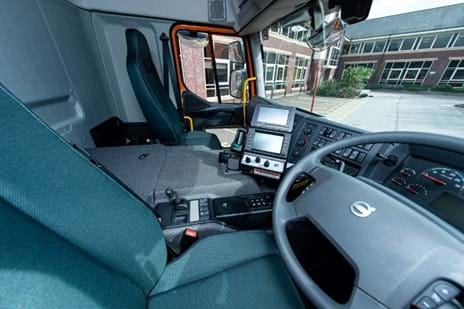National Highways is winter ready.
Published
24 Oct 2022
New state-of-the-art gritters for Yorkshire
Share this article
We're winter ready: £44m investment programme in state-of-the-art gritter vehicles now complete
New high-tech gritters will be in operation across Yorkshire this winter, helping to keep road users on the move when severe weather hits.
Thirty-seven state-of-the art vehicles have joined National Highways’ winter fleet this year in the Yorkshire and Humber area as part of a national £44m investment. Twenty-one were introduced in 2019 in the North East, taking the total of gritters operating across Yorkshire and the North East to 58.
In addition, the region has two new winter maintenance depots, one just off the A64 at Malton in North Yorkshire and another off the A63 near Newport in the East Riding of Yorkshire.
Senior Network Planner for Resilience Gordon Thackeray, who heads up National Highways’ winter operations in the region, said:
“We are delighted the rollout of our new state-of-the-art gritting vehicles is complete, with every machine in position and ready for the winter season ahead to help keep our road users safer on the roads, whatever weather conditions we face. National Highways always strives to explore and embrace innovation to benefit our road users. These vehicles are environmentally friendly, have cutting-edge technological features and can be driven at a higher speed than older models. We now have a total of 58 vehicles ready to be deployed across Yorkshire and the North East and all of them will play their part in helping our autumn and winter operations team, including our drivers, to carry out their vital work over the next few months to treat the road surfaces whenever and wherever it is needed.”
The leading-edge Volvo Romaquip gritting vehicles are eco-friendly and will benefit road users with precision salt spreading and other technological advances including:
- Enhanced performance: The gritters can travel at a maximum speed of 50mph when salt spreading - ten miles an hour faster than earlier vehicles – helping to keep traffic moving on the roads during periods of salt spreading.
- Eco-friendly: They are the cleanest and most efficient diesel heavy goods vehicles available in the UK, meeting Euro 6 requirements - the latest EU emission standards for heavy-duty CI (diesel) engines to reduce harmful exhaust emissions.
- Smart technology: On-board functions allow salting routes to be uploaded directly into the vehicle cockpit, assisting drivers with the latest information on where and when to salt.
- Precision spreading: Latest tech advances enable drivers to choose the most appropriate treatment in different road conditions.

The new depots, which are used as general maintenance depots and offices as well as for winter operations, both boast salt barns capable of holding 3,500 tonnes of salt. Each have three gritters based there, with two carrying out precautionary treatments and the third used during snow.
From Newport, the gritters will salt more than 70 miles of the M62 and A63 from Hull docks in the east to Ferrybridge, West Yorkshire, to the west.
Malton operates two precautionary routes which treat 61 miles of the A64 from near the coast at Scarborough to York.
Across Yorkshire and the North East there are 14 winter maintenance depots, ten in Yorkshire and four in the North East, and 58 gritters treating a total of almost 950 miles of trunk roads and motorways. The region also has four snow blowers.
There are more than 150 qualified winter drivers operating the fleet across the region and last year, from 1 October 2021 to April 2022, the gritters travelled 434,217 miles across Yorkshire and the North East.
All routes are designed to be treated within three hours.
In addition, the region has 48 weather stations that provide real time information about localised road conditions, enabling staff to identify the best time to send the gritters out, working closely with National Highways’ traffic officers, contractors and the emergency services.
Twenty-nine of these stations can be found across Yorkshire and 19 are based in the North East
